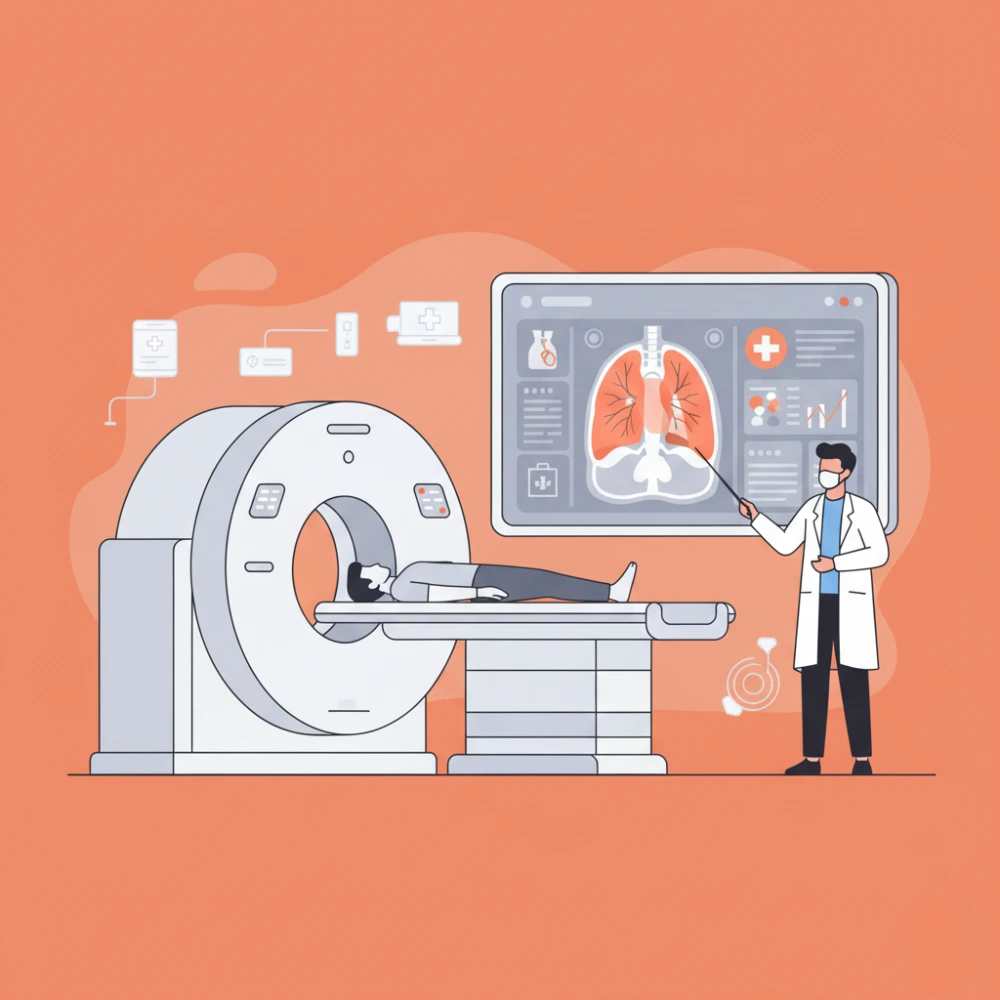
Chest CT Scan – Advanced, Accurate & Comprehensive Imaging
At Akshar Imaging Centre, we offer advanced Chest CT Scan services using state-of-the-art multidetector CT technology. Our scans provide high-resolution 3D images of the lungs, heart, airways, blood vessels, and surrounding chest structures, enabling doctors to detect lung infections, tumors, pulmonary embolism, chronic lung diseases, and cardiac abnormalities with precision.
A Chest CT Scan is a safe, non-invasive, and painless diagnostic imaging test. It delivers far more detailed information than standard X-rays, making it the preferred choice for evaluating respiratory conditions, cardiovascular concerns, trauma, and pre-surgical planning.
What Is a Chest CT Scan?
A Chest CT Scan uses advanced computed tomography to capture detailed cross-sectional images of the lungs, heart, airways, blood vessels, bones, and soft tissues within the chest. It helps doctors identify pneumonia, tuberculosis, lung nodules, lung cancer, pleural effusion, pulmonary embolism, and other thoracic abnormalities. The scan is crucial for early diagnosis, disease monitoring, and planning treatments or surgical interventions.
Why It’s Performed / Common Indications
- Persistent cough, shortness of breath, or unexplained chest pain
- Suspected lung infections such as pneumonia or tuberculosis
- Detection of lung nodules, tumors, or masses
- Evaluation of chronic lung diseases like COPD or interstitial lung disease
- Assessment of pulmonary embolism or blood clots in the lungs
- Detection of pleural effusion, fluid buildup, or other thoracic abnormalities
- Preoperative evaluation before cardiac or thoracic surgery
- Assessment after chest trauma or injury
- Monitoring response to lung or cardiac treatments
Preparation
- Usually, no special preparation is required.
- Remove any jewelry, watches, or metallic objects from the chest area.
- Wear a comfortable gown for the scan.
- Inform the technologist if you are pregnant or suspect pregnancy, as CT scans involve radiation.
- In some cases, a contrast dye may be required — disclose any allergies or kidney issues before the scan.
Procedure
- You will lie down on the CT scanner table, which moves slowly into the machine.
- The scanner rotates around your chest to capture high-resolution images.
- You may be asked to hold your breath for a few seconds to avoid motion blur.
- If contrast dye is needed, it will be administered via an IV line.
- The scan itself takes just a few minutes; the entire process usually lasts 10–15 minutes.
What Happens Next (Interpretation)
A radiologist carefully reviews the Chest CT images to identify:
- Lung infections, nodules, tumors, or masses
- Pulmonary embolism or blood clots
- Pleural effusions or fluid accumulation
- Airway and lung structure abnormalities
- Cardiac and major vessel evaluation
- Bone fractures or chest trauma
- Extent of disease for preoperative or treatment planning
Reports are delivered promptly and shared with your doctor for accurate diagnosis and timely treatment.
Benefits vs. Risks
Benefits:
- Provides highly detailed 3D images of the lungs, heart, and chest structures
- Detects minor abnormalities missed by X-rays
- Essential for diagnosis, treatment planning, and pre-surgical evaluation
- Quick, accurate, and non-invasive imaging tool
Risks:
- Involves a small dose of radiation (minimized with modern CT scanners)
- Rare risk of allergic reaction if contrast dye is used
- Generally not recommended during pregnancy unless medically necessary
Why Choose Akshar Imaging Centre
- Advanced multidetector CT scanner for high-resolution chest imaging
- Experienced radiologists specialized in thoracic and cardiac diagnostics
- Comfortable, patient-friendly environment
- Minimal wait times and fast report delivery
- Convenient location in Ahmedabad with easy scheduling options
Frequently Asked Questions (FAQs)
1. Is a Chest CT Scan safe?
Yes. It involves low radiation exposure and is considered very safe. Extra precautions are taken for children and pregnant women.
2. How long does the scan take?
The scan itself takes only a few minutes; the complete appointment usually lasts around 10–15 minutes.
3. Why has my doctor advised this test?
It may be to evaluate lung infections, chest pain, nodules, tumors, pulmonary embolism, or pre-surgical assessment.
4. Do I need contrast dye for this scan?
Contrast is used only if your doctor requires more detailed imaging of blood vessels or specific tissues.
